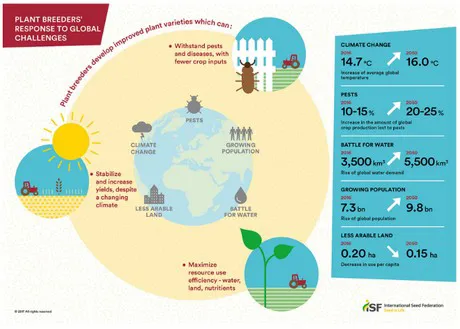On 28-29 June last year, OECD organised a conference on Genome Editing. The conference proceedings and related publications have just been published.
Petra Jorasch, Manager Plant Breeding Innovation Advocacy at Euroseeds, gave a presentation on the global need for plant breeding innovation on behalf of the International Seed Federation. The article presented by Jorasch was also recently published.
It presents an overview of the main arguments why plant breeding innovation will play a role in view to meet the global challenges like climate change, a growing world population and the need for resource-efficient farming systems.
The article addresses the following items:
- The plant breeding innovation tradition
- Precision breeding as an integral part of the holistic breeding approach
- The general breeding goals do not change
- Consistent criteria for the scope of regulatory oversight
- Process for determining regulatory status

The OECD Conference on Genome Editing: Applications in Agriculture – Implications for Health, Environment and Regulation explored the safety and regulatory considerations raised by genome-edited products, with the aim to favour a coherent policy approach to facilitate innovation involving genome editing and brought together policy makers, academia, innovators and other stakeholders involved in the topic.
The conference was organised across three themes:
- Applications of genome editing in agriculture – including plant and animal breeding
- Risk and safety considerations
- Regulatory aspects
Genome editing – set of techniques in which specialised enzymes have been modified – can insert, replace or remove DNA from a genome with a high degree of specificity. Genome editing, and one of its most discussed techniques the CRISPR/Cas9 system, has received increasing attention in the academic press and the wider media. This advanced form of genetic engineering provides tools at relatively low cost for innovation in biomedicine, agriculture, industrial biotechnology and other sectors relating to the bioeconomy.
For more information:
European Seed Association
Ana ASCENÇÃO E SILVA, Manager Communications
T: +32 2 743 28 60
anasilva@euroseeds.eu
www.euroseeds.eu
